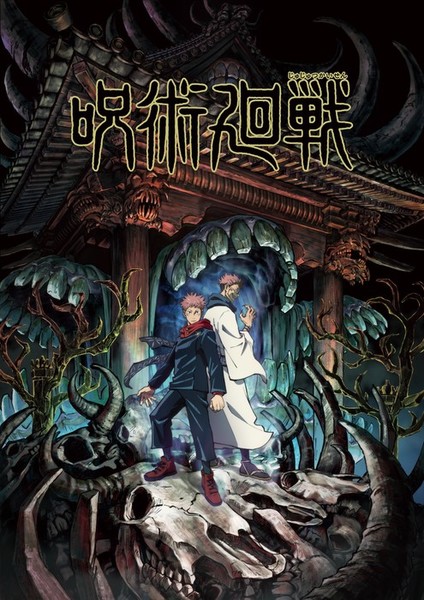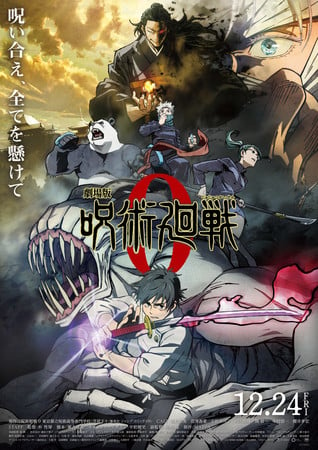Anime Expo 2022 - Behind the Scenes of Jujutsu Kaisen with MAPPA CEO, Lead Scriptwriter
by Kalai Chik, Following Jujutsu Kaisen's popular two-cour television anime, its prequel film became 2021's highest
grossing movie in Japan. In early 2022, Jujutsu Kaisen was confirmed for a second season that is set to
release the following year. Although further information on season two has been tight-lipped, ANN sat
down with Manabu Otsuka (CEO, Studio MAPPA), Hiroshi Seko (scriptwriter), and Hiroaki Matsutani
(TOHO producer) to discuss the details on how they adapted the original series into both a TV anime and
film.
Following Jujutsu Kaisen's popular two-cour television anime, its prequel film became 2021's highest
grossing movie in Japan. In early 2022, Jujutsu Kaisen was confirmed for a second season that is set to
release the following year. Although further information on season two has been tight-lipped, ANN sat
down with Manabu Otsuka (CEO, Studio MAPPA), Hiroshi Seko (scriptwriter), and Hiroaki Matsutani
(TOHO producer) to discuss the details on how they adapted the original series into both a TV anime and
film.
When MAPPA announced the movie, Jujutsu Kaisen 0, shortly after the end of season one, was there a risk to developing a movie about a prequel to the series?
Otsuka: Yes, there might have been a risk. Because if you look at it from the perspective of them finishing two cours of the series—and then going into a film that doesn't have the characters that people are familiar with—there might have been a risk. But when we saw the 0 story, it was such a powerful story by itself. We were pretty confident that the fans were going to enjoy it by itself.
Hiroshi Seko has been widely praised for his involvement for Jujutsu Kaisen's anime and film screenwriting. How did you build up and develop Okkotsu from a timid protagonist to a hero without elongating his monologues?
Seko: In the movie, the expectation is to see Okkotsu's growth as a character. There's only one shot to really show his growth as a person. In order to do that, I wanted to make it clearer by adjusting some of the scenes from the original manga to make that growth clearer to the viewers.
 Were the movie specific scenes shown in the panel part of your strategy to give more insight
into Okkotsu's character?
Were the movie specific scenes shown in the panel part of your strategy to give more insight
into Okkotsu's character?
Seko: Since the original manga is only one volume to begin with, we already knew from the beginning the movie would be short 30 minutes in a film adaptation. Because we had that in mind from the beginning when we were producing this movie, we knew that there would have to be original scenes to fill up that time. To be clear, rather than using those movie-only scenes as a way to show character growth, we were trying to make up for the time we needed in order to make a film version.
There's a lot of drama but also comedic banter between the teenagers, the adults, and the cursed spirits in the series. How do you strike that balance?
Seko: It's mostly based off of the original materials. The original dialogue is carrying it right into the anime. Of course, there are parts that might be more emphasis maybe, but it's not that different from the actual original materials that are there.
The post credits shorts, Juju Sanpo, is original to the anime. Whose idea was it to have that included?
Matsutani: Speaking from TOHO's perspective, when we were working on production, we knew that there would be materials that we needed to create other than the original materials we had. When we were planning, we spoke with author Gege Akutani, and discussed what can we do to add to it and he came up with the draft.
Was Akutani solely responsible for Juju Sanpo or were MAPPA staff pitching ideas as well? I've seen Akutani's sketches shared on the Jujutsu Kaisen website.
Matsutani: Staff from MAPPA (such as Seko) and Shueisha are involved in the meetings, but it is mostly Akutani's ideas. He would draft ideas out after he and the team would brainstorm together. But he's the one creating the material and then submitting it to the staff.
As Manabu Otsuka and Hiroaki Matsutani mentioned in the panel, when adapting manga to anime, you need to add sound and music. How did you decide on choosing composers Hiroaki Tsutsumi and Yoshimasa Terui?
Matsutani: Originally when we were thinking about the music for the series, we would refer to the TOHO music producer, Yoshiki Kobayashi. That was the first step in talking about what kind of music direction we're going to take for the series. When it came to more details, the director would discuss them with author Akutani to come up with a vision for what sort of sound they wanted to hear in the series. After they discussed it, they realized that it might make sense for this series to have multiple music directions. This is why Jujutsu Kaisen had three other composers other than Tsutsumi and Terui.
You've worked with mainstream J-pop/alternative rock artists—Eve, Ali, and King Gnu—for Jujutsu Kaisen. Who can we expect for Season 2? What mood can we expect?
Matsutani: The TOHO side will be working on it as well this time, but we can't say anything yet. We are working on something right now. Considering what the fans will enjoy and what they'll expect.
In marketing, the general advice is to have bright, saturated colors to catch the audience's attention. But the general colors in the promotional material, and in Akutani's original manga, are dark and muted colors. What were marketing techniques that you used to promote the series?
Otsuka: The series features a lot of nighttime scenes, which would naturally make things look darker. We made sure the coloring and color settings would still make the visuals look alluring and catchy.